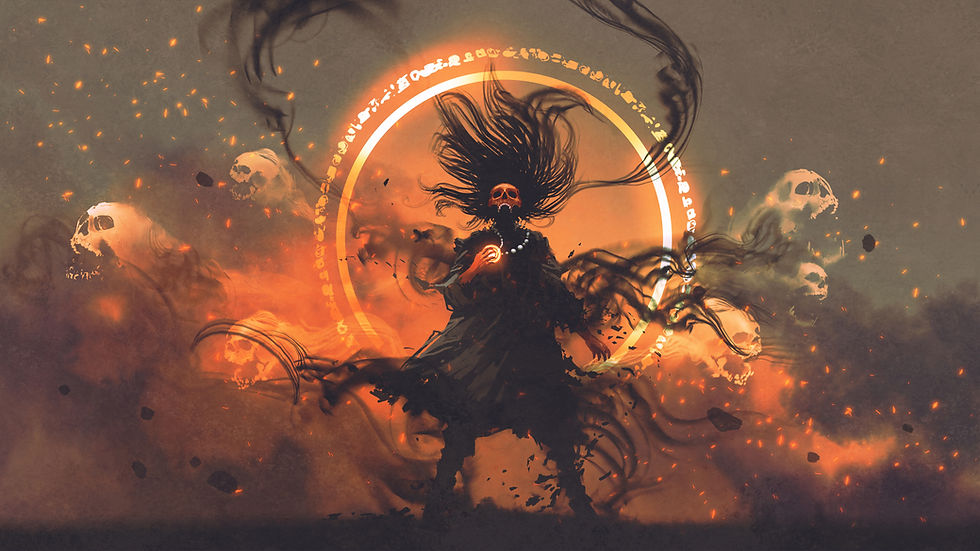Medieval Alchemy: Jean de Roquetaillade
- Sylvia Rose

- Aug 23, 2024
- 5 min read
Jean de Roquetaillade (1310 - 1370 AD) or John of Rupescissa is a prominent figure in medieval France. A fiery Franciscan friar, alchemist and eschatologist, Roquetaillade is known for his work in alchemy and theology.

His alchemical pursuits are entwined with Franciscan ascetic spiritual beliefs and the thunderous doomsday voice of prophecy. He targets corruption in the Church. At the same time he works to create a unique blend of science and religion.
A study of the End of Days, eschatology centers on concepts such as Apocalypse, death, judgment, the ultimate fate of the soul and humanity as a whole. Believers seek insight into the existential concerns of humanity, and the ultimate purpose of existence.

Christian eschatology explores belief systems concerning final destiny of the soul and the end of the world as outlined in Christian theology. The Four Last Things, the Last Four or "quattuor novissima" have a central role in the structure.
These four components - Death, Judgment, Heaven, and Hell - are seen as culmination of the soul's voyage through life and into the afterlife. Death, the initial of the Four Last Things, signifies the conclusion of earthly life and passage to the subsequent stage of being.

Aspects include societal collapse, human extinction and other final events in human history. The term eschatology comes from Greek eskhatos 'last'. It first appears in the 19th century, when the human desire to label things reaches academic peaks.
Apocalypticism itself is a facet of eschatology, concerned with the Book of Revelation which prophesizes total destruction and devastation of the earth and the people who remain on it at the end of that time; and the beginning of the thousand year reign of Jesus Christ.
After studying philosophy for five years in Toulouse, he joins the Franciscan monastery in Aurillac, south central France. There he continues his studies for five more years. Distillation experiments lead to discovery of what he calls aqua vitæ, Water of Life or quinta essentia,
In France as well as Italy alchemy is welcomed by the nuns and friars. Convents and monasteries, terms often interchangeable in medieval times, do their alchemical work for the benefit of humankind, in medicines or longevity elixirs.

Roquetaillade promotes his aqua vitae, ascribing to it unparalleled healing properties. In the realm of alchemy, the pursuit of a universal remedy or panacea is a central aspiration. This mystical elixir is a promise of hope in a world rife of suffering and uncertainty. .
However, his predictions and outspoken criticism of church misconduct arouse enmity of superiors, and he's confined in a local Franciscan convent. There he continues his writings.

While being transferred from one convent to another in 1349, he manages to reach Avignon, the seat of the Papacy, and appeal to Pope Clement VI. While there he writes Visiones seu revelationes in 1349, followed by Vade Mecum in tribulatione and Liber Ostensor in 1356.
In 1356, Jean de Roquetaillade addresses the future of the papacy through his two principle works. The Liber ostensor quod adesse festinant tempora is a comprehensive piece of scholarly work analyzing medieval prophetic texts.

In this treatise, Roquetaillade gives detailed interpretations of prophecies found in ancient writings. He offers unique insights appealing to scholars and theologians. The Vade mecum in tribulatione emerges as a concise yet powerful summary of Roquetaillade's divine vision.
Despite its brevity, this work increases his influence in France and the rest of Europe. The printing press doesn't appear until 1454. Books are handmade, painted or otherwise illustrated and bound in a codex, the book format used by today's literary system.

Medieval churches, social and intellectual circles circulate manuscripts. Members write commentaries, which themselves pass around. Texts are translated, especially in convents due to literacy rates. Many works lost in time are known due to commentaries and/or translations.
Central to Roquetaillade's narrative is the concept of a future Franciscan pope, known as the reparator (renewer, restorer). He is to be the embodiment of the "angel pope" inspired by spiritual Franciscan ideals.

The election of this enigmatic figure is thought to bring about the dawn of enlightenment in religion. Roquetaillade describes this time as characterized by a harmonious relationship between the papacy and secular powers.
This integral interaction provides a period of restoration and collaboration before the ominous ascent of the Antichrist. While incarcerated, Roquetaillade dedicates a substantial portion of time expounding on this pivotal theme.

Roquetaillade's writings emphasize a shift in the leadership of the Church. He says leadership of the Church will be “taken away from wicked prelates” and assumed by holy men of the Franciscan Order.
The Franciscan ideals of simplicity, poverty, and compassion are the essential qualities needed for those in positions of leadership within the Church. The anticipated transfer of power drives the cycle of renewal and reform within the Church.

The narrative of moving from corruption to virtue, from self-interest to service, resonates with a broader call for authenticity and accountability in spiritual leadership. People support a return to core values.
The Liber ostensor and Vade mecum give an idea of the extensive body of work he produces on this subject. Through these writings, Roquetaillade's legacy endures. Other alchemical friars include Roger Bacon, Albertus Magnus, George Ripley and Tommaso d'Eremita.

Among his other works are commentaries on the Oraculum Cyrilli, the recently discovered Sexdequiloquium, and numerous other lost treatises and interpretations of various prophecies.
Jean de Roquetaillade dies c.1370 in Avignon.
Non-Fiction Books:
Fiction Books:
READ: Lora Ley Adventures - Germanic Mythology Fiction Series
READ: Reiker For Hire - Victorian Detective Murder Mysteries



